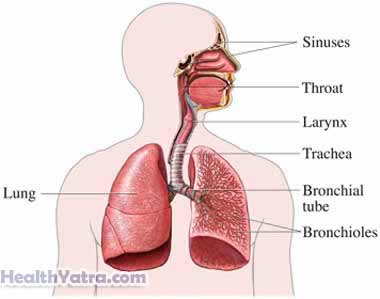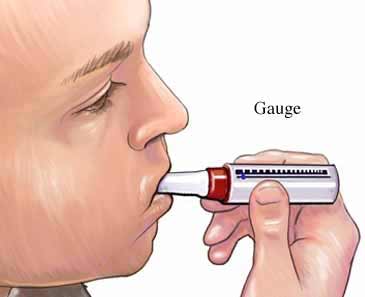Definition
Pulmonary function tests (PFTs) are a group of breathing tests. They can show how well your lungs are working. PFTs may measure:
- How much air you can blow out
- How much air your lungs can hold at different times
- How hard you are blowing air out

Reasons for Test
PFTs may be used to diagnose lung conditions or diseases, such as:
- Asthma
- Emphysema
- Chronic bronchitis
These tests may also be done to:
- Measure how much a lung problem is affecting you
- Evaluate symptoms such as coughing, wheezing, and trouble breathing
- Evaluate your lung function before a surgery
- Determine how well a treatment is working
Possible Complications
There are no major complications associated with this procedure.
What to Expect
Prior to Test
- Review your medicines with your doctor. You may need to stop taking some before testing.
- Do not eat, smoke, or exercise 4-8 hours before testing.
- Wear loose-fitting clothing.
Description of Test
Most tests will require you to breathe into a mouthpiece. The mouthpiece may be attached to a simple handheld device or be part of a larger machine. Examples of devices are a spirometer or peak flow meter. You may be asked to breathe in and out in different patterns and speeds. You will rest between tests.
Tell the technician right away if you have breathing problems, pain, or dizzinessduring testing.

Other tests that may be used in some situations include:
- A brief period of exercise before the test.
- Oxygen saturation test to measure the amount of oxygen in the blood. Can be measured with a small clip on your finger.
- You may be exposed to a specific chemical during the PFT. The test will determine if your breathing changes due to that chemical. This is only done under close and careful supervision.
After Test
Rest until you feel able to leave. You may be given medicine if testing has caused wheezing, coughing, and/or difficulty breathing.
How Long Will It Take?
20-45 minutes
Will It Hurt?
The test does not hurt. You may feel symptoms of your lung condition during or immediately following testing.
Results
Your doctor will compare the results of your tests with normal values based on your age, sex, and height. Your doctor will discuss the results with you and decide if further testing or treatment is needed.
Call Your Doctor
After the test, call your doctor if any of the following occurs:
- Headaches, nausea, muscle aches, dizziness, or general ill feeling
- Shortness of breath or difficulty breathing
- Chest pain
